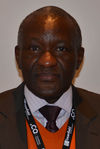Edmund Katiti: Difference between revisions
No edit summary |
m added Category:NGO Worker using HotCat |
||
| (3 intermediate revisions by 2 users not shown) | |||
| Line 4: | Line 4: | ||
|born = | |born = | ||
|country = Uganda | |country = Uganda | ||
|email = | |email = edmundk[at]nepad.org | ||
|website = | |website = | ||
|blog = | |blog = | ||
|twitter = | |twitter = | ||
|facebook = | |facebook = | ||
|linkedin = | |linkedin =http://www.linkedin.com/in/edmundkatiti | ||
|userbox = | |userbox = | ||
}} | }} | ||
'''Dr. Edmund Katiti''' is the | '''Dr. Edmund Katiti''' is the Acting Head of NEPAD e-Africa Programme, (The New Partnership for Africa's Development), which he joined in November 2005. NEPAD is part of the African Union.<ref>[http://www.intgovforum.org/cms/index.php/component/chronocontact/?chronoformname=2011PanelistBioView&wspid=227 Panelist Bio, IntGovForum.org]</ref> On joining the NEPAD Agency, Dr. Katiti first served as a Policy and Regulatory Advisor, in which capacity he coordinated the development of policy and regulatory frameworks for NEPAD ICT infrastructure programmes and projects. He is involved in regional and international ICT fora, such as [[ICANN]], the [[ITU]], the [[IGF]], [[UNCTAD]], the [[IEEE]], and others.<ref>[http://www.linkedin.com/in/edmundkatiti EdmundKatiti, LinkedIn.com]</ref> He has been involved with [[ICANN]]'s [[ASO]].<ref>[http://aso.icann.org/people/icann-board-elections/2001-elections/edmund-katiti/ 2001 Elections, ASO.ICANN.org]</ref> | ||
===NEPAD=== | ===NEPAD=== | ||
As ICT Coordinator for NEPAD, Dr. Katiti is involved in convening consensus-building stakeholder meetings and workshops, participating in regional meetings and conferences related to | As ICT Coordinator for NEPAD Agency, Dr. Katiti is responsible for harmonisation and coordination of regional and continental ICT programmes and projects. Dr. Katiti is also involved in convening consensus-building stakeholder meetings and workshops, participating in regional meetings and conferences related to ICT development, conducting studies as needed, and reporting back to the stakeholders.<ref>[http://www.afri-tech.com/archives/1006 Archives, Afri-tech.com]</ref> | ||
Dr. Edmund Katiti was responsible for developing and implementing the Kigali Protocol (2006), which is a policy and regulatory framework to accelerate the development of ICT broadband infrastructure in Africa. The Protocol is guided by policy principles based on non-discriminatory, open access and equitable joint ownership of the backbone infrastructure across the region; the use of Special Purpose Vehicles( SPV’s) to build, own and operate the NEPAD Network, which is considered a ‘’public good’’; and the need to apply the principle of Public-Private Partnership to develop the network. The protocol promotes and facilitates the provision of ICT broadband infrastructure on the continent that will support high-quality speed and reliable electronic communication at affordable prices.<ref>[http://www.terrapinn.com/2012/satcom-africa/speaker-edmund-KATITI.stm Speaker, Edmund Katiti, Terrapinn.com]</ref><ref>[http://www.eafricacommission.org/whats-new/news/20/10/2009/kigali-protocol-policy-and-regulatory-framework-accelerate-development-ict Kigali Protocol Policy and Regulatory Framework Accelerate Development, EAfricaCommission.org]</ref> | |||
He is currently working with the African Union and [[UniForum]] with regards to the latter's bid for the [[.africa]] [[New gTLD Program|New gTLD]].<ref>[[ICANN 45]] Interview</ref> | He is currently working with the African Union and [[UniForum]] with regards to the latter's bid for the [[.africa]] [[New gTLD Program|New gTLD]].<ref>[[ICANN 45]] Interview</ref> | ||
| Line 25: | Line 25: | ||
He studied Electrical and Electronics Engineering at the South Bank Polytechnic in London, UK, after which he pursued a Masters in Telecommunication Systems Engineering and a Ph.D. in the same field at the University of Essex, UK. | He studied Electrical and Electronics Engineering at the South Bank Polytechnic in London, UK, after which he pursued a Masters in Telecommunication Systems Engineering and a Ph.D. in the same field at the University of Essex, UK. | ||
===Personal Achievements=== | ===Personal Achievements=== | ||
* William Beedie Esson Scholarship from the [[ | * William Beedie Esson Scholarship from the [[IEE|Institute of Electrical Engineers]] (IEE), 1975/76 | ||
* Undergraduate Scholarship from the [[ | * Undergraduate Scholarship from the [[IEE]], 1976/77 | ||
* Invented a Technique for Image Transform Coding with Offsets. Reported in Electronics Letters, Vol. 17 pp. 803 – 805, August 1981 | * Invented a Technique for Image Transform Coding with Offsets. Reported in Electronics Letters, Vol. 17 pp. 803 – 805, August 1981 | ||
* Invented technique for improving computational efficiency of orthogonal transforms. Reported at the 1st International Conference on Electronic Image processing, York, UK July 1982 | * Invented technique for improving the computational efficiency of orthogonal transforms. Reported at the 1st International Conference on Electronic Image processing, York, UK July 1982 | ||
* Invented variety of Television special effects. See Ph.D. Thesis, Aug. 81 – Oct. 82 | * Invented a variety of Television special effects. See Ph.D. Thesis, Aug. 81 – Oct. 82 | ||
* Demonstrated that the Discrete Sine Transform is a more efficient Image Processor than the Discrete Cosine Transform. See Ph.D. Thesis, March 1983 | * Demonstrated that the Discrete Sine Transform is a more efficient Image Processor than the Discrete Cosine Transform. See Ph.D. Thesis, March 1983 | ||
* Founded the Institute of Computer Science, Makerere University, 1984 – 1986 | * Founded the Institute of Computer Science, Makerere University, 1984 – 1986 | ||
* Created the first private television broadcasting station in Uganda, 1992 | * Created the first private television broadcasting station in Uganda, 1992 | ||
* Lead Consultant for the Uganda National Task Force on formulation of | * Lead Consultant for the Uganda National Task Force on the formulation of a national ICT Policy, Feb 2000<ref>[http://aso.icann.org/people/icann-board-elections/2001-elections/edmund-katiti/ 2001 elections, ASO.ICANN.org]</ref> | ||
==References== | ==References== | ||
{{reflist}} | {{reflist}} | ||
__NOTOC__ | __NOTOC__ | ||
[[Category:NGO Worker]] | |||
[[Category:Policy Advisors]] | |||
Latest revision as of 18:05, 7 July 2021
 |
 |
| Country: | Uganda |
| Email: | edmundk[at]nepad.org |
| LinkedIn: |
Dr. Edmund Katiti is the Acting Head of NEPAD e-Africa Programme, (The New Partnership for Africa's Development), which he joined in November 2005. NEPAD is part of the African Union.[1] On joining the NEPAD Agency, Dr. Katiti first served as a Policy and Regulatory Advisor, in which capacity he coordinated the development of policy and regulatory frameworks for NEPAD ICT infrastructure programmes and projects. He is involved in regional and international ICT fora, such as ICANN, the ITU, the IGF, UNCTAD, the IEEE, and others.[2] He has been involved with ICANN's ASO.[3]
NEPAD
As ICT Coordinator for NEPAD Agency, Dr. Katiti is responsible for harmonisation and coordination of regional and continental ICT programmes and projects. Dr. Katiti is also involved in convening consensus-building stakeholder meetings and workshops, participating in regional meetings and conferences related to ICT development, conducting studies as needed, and reporting back to the stakeholders.[4]
Dr. Edmund Katiti was responsible for developing and implementing the Kigali Protocol (2006), which is a policy and regulatory framework to accelerate the development of ICT broadband infrastructure in Africa. The Protocol is guided by policy principles based on non-discriminatory, open access and equitable joint ownership of the backbone infrastructure across the region; the use of Special Purpose Vehicles( SPV’s) to build, own and operate the NEPAD Network, which is considered a ‘’public good’’; and the need to apply the principle of Public-Private Partnership to develop the network. The protocol promotes and facilitates the provision of ICT broadband infrastructure on the continent that will support high-quality speed and reliable electronic communication at affordable prices.[5][6]
He is currently working with the African Union and UniForum with regards to the latter's bid for the .africa New gTLD.[7]
Background
Dr. Katiti's previous roles include Deputy Vice Chancellor for Academic Affairs at Kampala International University; founding Director of the Institute of Computer Science, Makerere University, Uganda; President of the Uganda Computer Society (1998-1990); and Chairman of the Uganda National Standards Council (1995-2000).[8][9]
He studied Electrical and Electronics Engineering at the South Bank Polytechnic in London, UK, after which he pursued a Masters in Telecommunication Systems Engineering and a Ph.D. in the same field at the University of Essex, UK.
Personal Achievements
- William Beedie Esson Scholarship from the Institute of Electrical Engineers (IEE), 1975/76
- Undergraduate Scholarship from the IEE, 1976/77
- Invented a Technique for Image Transform Coding with Offsets. Reported in Electronics Letters, Vol. 17 pp. 803 – 805, August 1981
- Invented technique for improving the computational efficiency of orthogonal transforms. Reported at the 1st International Conference on Electronic Image processing, York, UK July 1982
- Invented a variety of Television special effects. See Ph.D. Thesis, Aug. 81 – Oct. 82
- Demonstrated that the Discrete Sine Transform is a more efficient Image Processor than the Discrete Cosine Transform. See Ph.D. Thesis, March 1983
- Founded the Institute of Computer Science, Makerere University, 1984 – 1986
- Created the first private television broadcasting station in Uganda, 1992
- Lead Consultant for the Uganda National Task Force on the formulation of a national ICT Policy, Feb 2000[10]
References
- ↑ Panelist Bio, IntGovForum.org
- ↑ EdmundKatiti, LinkedIn.com
- ↑ 2001 Elections, ASO.ICANN.org
- ↑ Archives, Afri-tech.com
- ↑ Speaker, Edmund Katiti, Terrapinn.com
- ↑ Kigali Protocol Policy and Regulatory Framework Accelerate Development, EAfricaCommission.org
- ↑ ICANN 45 Interview
- ↑ Bio, ITU.int
- ↑ Speaker Edmund Katiti, Terrapinn.com
- ↑ 2001 elections, ASO.ICANN.org
